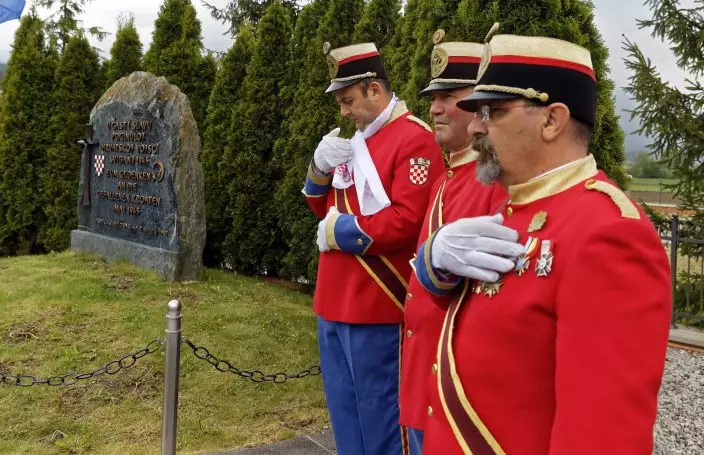Thousands of Croatian far-right supporters gathered in a field in southern Austria on Saturday to commemorate the massacre of pro-Nazi Croats by communists at the end of World War II.
For Croatian nationalists, the controversial annual event near the village of Bleiburg symbolizes their suffering under communism in the former Yugoslavia before they fought a war for independence in the 1990s. But Bleiburg's mayor Stefan Visocnik branded the event "a mask for the glorification of Nazism."
Tens of thousands of Croatians, mostly pro-fascist soldiers and their families, fled to the region in May 1945 amid a Yugoslav army offensive, only to be turned back from Austria by the British military and into the hands of anti-fascists. Thousands of the so-called Ustashas were killed in and around Bleiburg.

Mourners from Croatia attend a liturgiccal service for victims of the end of WWII events in Bleiburg, southern Austria, Saturday, May 18, 2019. Thousands of Croatian far-right supporters have gathered in a field in southern Austria to commemorate the massacre of pro-Nazi Croats by communists at the end of World War II. (AP PhotoDarko Bandic)
Austria's anti-fascist groups, waving the former Yugoslavia's flags with the communist red star and signs "Death to Fascism," held small protests during the event attended by some 10,000 Croatians.
Hundreds of Austrian police officers were deployed and police helicopters hovered above the prayer ceremony on the vast field surrounded by mountains. The rally was peaceful and no incidents were reported.
Tens of thousands of Jews, Serbs, Gypsies and anti-fascist Croats were killed in Ustasha-run death camps during WWII.

Honor guards stand next to a monument during a liturgical service for victims of the end of WWII events in Bleiburg, southern Austria, Saturday, May 18, 2019. Thousands of Croatian far-right supporters have gathered in a field in southern Austria to commemorate the massacre of pro-Nazi Croats by communists at the end of World War II. (AP PhotoDarko Bandic)
Since last year, Austrian authorities have banned the black Ustasha flags and insignia with the letter "U'' at the gathering in Blaiburg. The local Austrian church refused to take part in the commemoration.
Ruza Tomasic, a conservative Croatian representative in the European parliament, said the commemoration has nothing to do with extremism, and that the massacre represents "a great tragedy."
"In 1945 when the Independent State of Croatia failed, civilians, kinds old and young men, they all started going toward Austria because they were told the English soldiers will spare them," she said. "Unfortunately, when they signed the surrender they turned them to the communists and they just killed them."
"When we come here to remember them in our prayers, we are not allowed. They are putting too much security here as if we came here to start the war or something," she said.


